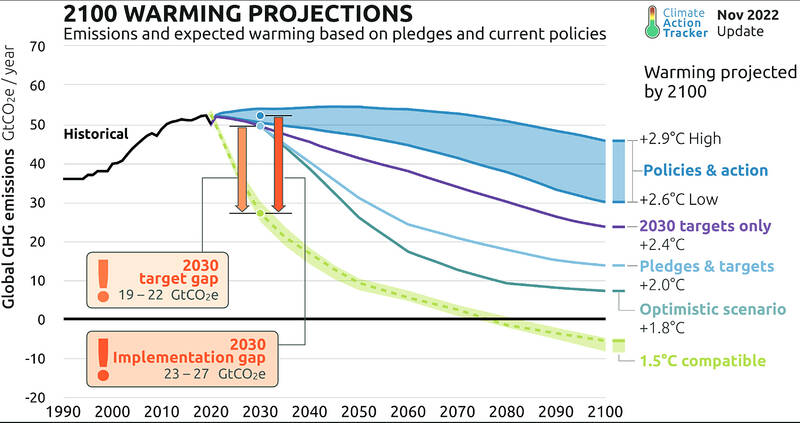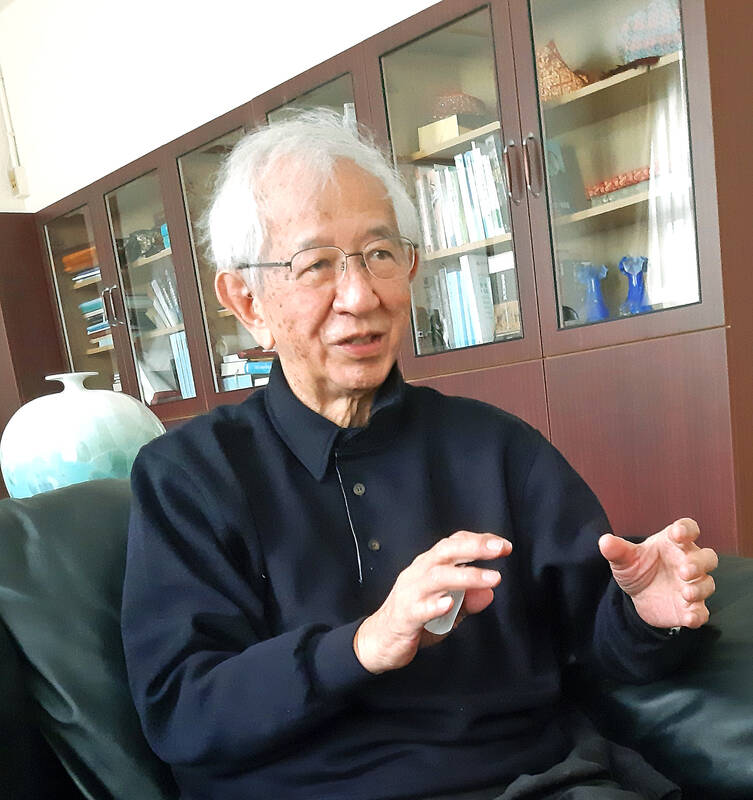“Before the end of the century, if we do not learn to operate as one community for the entire world, I think the chances of humanity to survive on Earth will be very, very small,” Taiwanese scientist Lee Yuan-tseh (李遠哲) said in 2005, calling for a change in the way humanity uses energy.
Eighteen years on, not only are the cautionary words more relevant, for Lee, there is a pressing need to communicate the effects of global warming as he spoke of Taiwan’s progress — or lack thereof — in implementing efficient energy policies and accelerating the deployment of renewable energy to tackle the climate crisis.
“The government’s energy policy is full of faults,” Lee said in an interview with the Taipei Times late last month, lamenting that the “tepid” climate plan drafted by President Tsai Ing-wen’s (蔡英文) administration has failed to consider future generations.

Photo courtesy of Climate Action Tracker
A UN online statement on climate action says: “To avert the worst impacts of climate change and preserve a livable planet, global temperature increase needs to be limited to 1.5°C above pre-industrial levels,” adding that Earth is about 1.1°C warmer than in the late 1800s, and emissions continue to rise.
As a member of the global village, Taiwan has joined the call to cut carbon emissions to net zero by 2050, a goal the UN bills as “this century’s global imperative.”
In addition to a 2050 deadline for carbon neutrality set in the Climate Change Adaptation Act (氣候變遷因應法) last month, the government in December last year also said that Taiwan by 2030 would reduce emissions by about 25 percent from 2005 levels.

Photo: Huang Tai-lin, Taipei Times
Although that target betters a previous benchmark of 20 percent, it pales in comparison with two industrialized neighbors.
Japan in 2021 revised its climate plan to a more ambitious target to reduce greenhouse gas emissions by 46 to 50 percent from 2013 levels by 2030. South Korea also accelerated efforts to reach carbon neutrality by 2050, with a commitment to reduce carbon emissions by 40 percent from 2018 levels by 2030.
“The path of progress [Taiwan] is taking is not good, which is evidenced by having so far failed to set an ambitious target to reduce greenhouse gas emissions,” Lee said.
“The 2030 goal set by the government means we are still far behind 25 percent. It said it would ‘make up’ for the remaining figure by 2026, but as of now, we are already lagging behind,” Lee said. “How could you get there in three years?”
In the “Taiwan Pathway to Net Zero Emissions in 2050” strategy unveiled by the National Development Council on Dec. 28, the government seeks to have renewable energy account for 27 to 30 percent of the nation’s energy mix by 2030, with coal accounting for 20 percent and liquefied natural gas 50 percent.
The strategy aims to have renewable energy produce about 65 percent of the nation’s energy by 2050, with thermal power comprising about 24 percent, hydrogen power about 10 percent and hydroelectric power 1 percent.
Thermal power generation (including coal, gas and oil-fired power generation) comprised 79.6 percent of the nation’s electricity production in 2021, with renewable energy sources at 6.3 percent, pumped-storage hydroelectricity 1.3 percent and nuclear energy 10.8 percent, data from Taiwan Power Co showed.
Renewable energy sources are expected to make up 10 percent of the nation’s electricity production this year, up from 8.6 percent last year, the Ministry of Economic Affairs’ Bureau of Energy said last month.
Regardless, “much effort is still needed for us to catch up in other areas such as wind and solar energy,” Lee said.
Lee was the first laureate born and educated in Taiwan when he was awarded the 1986 Nobel Prize in Chemistry with Dudley Herschbach and John Polanyi, for their contributions to the development of reaction dynamics.
Lee later served as president of Taiwan’s highest academic research institute, Academia Sinica, from 1994 to 2006, and president of the France-based International Council for Science from 2011 to 2014.
It was during his tenure there that the council, in partnership with the World Federation of Engineering Organizations, contributed research to the 2012 UN Conference on Sustainable Development.
Lee’s efforts to raise awareness on environmental sustainability also led to his selection by the US-based National Academy of Sciences in 2020 as one of 10 laureates featured in a photographic exhibition called Advancing Rights and Freedoms: Science, Human Dignity, and the Nobel Prize.
A key area the Tsai government has overlooked in its net zero framework is economic development, Lee said.
“New factories keep appearing, but you don’t see the government restricting their energy use. Instead it is all talk about bringing in more investment,” Lee said.
“Rampant development keeps swelling, and so is energy consumption,” he added.
Although the government said that projects were developed with some caps on carbon emissions, none of those goals have been reached, he said.
When Taiwan was an agricultural society, “if there was a less than optimal harvest one year, then we’d say ‘let’s eat less,’” Lee said. “The government today lacks such foresight. We should economize and not squander.”
Vice President William Lai (賴清德), who is also the Democratic Progressive Party chairman, has made climate change a central focus of the party’s agenda.
Asked what advice he would share with Lai, Lee said that Taiwan should purchase clean energy from other countries if it cannot produce enough of its own.
Exercising influence over the Executive Yuan via his role as the ruling party chairman, Lai should also direct the government toward revising economic development plans and introducing a carbon tax, starting with large emitters, Lee said.
“As a leader, the most important thing [for Lai] is to have the message reach people’s hearts and let the public realize: ‘This path to act and to seek environmental sustainability is the right direction to go,’” he added.
Lee, who has championed climate issues for decades, believes there is a light at the end of the global-warming tunnel.
“The key lies in each and every individual’s awakening,” he said, adding that communication across all of society is crucial to make the public aware of the urgency.
“I hope for a new wave of awakening, which would be vital for the survival and sustainable development of humankind,” Lee said. “It is our responsibility to hand over a better Earth to future generations.”
This story has been amended since it was first published.

‘DENIAL DEFENSE’: The US would increase its military presence with uncrewed ships, and submarines, while boosting defense in the Indo-Pacific, a Pete Hegseth memo said The US is reorienting its military strategy to focus primarily on deterring a potential Chinese invasion of Taiwan, a memo signed by US Secretary of Defense Pete Hegseth showed. The memo also called on Taiwan to increase its defense spending. The document, known as the “Interim National Defense Strategic Guidance,” was distributed this month and detailed the national defense plans of US President Donald Trump’s administration, an article in the Washington Post said on Saturday. It outlines how the US can prepare for a potential war with China and defend itself from threats in the “near abroad,” including Greenland and the Panama

The High Prosecutors’ Office yesterday withdrew an appeal against the acquittal of a former bank manager 22 years after his death, marking Taiwan’s first instance of prosecutors rendering posthumous justice to a wrongfully convicted defendant. Chu Ching-en (諸慶恩) — formerly a manager at the Taipei branch of BNP Paribas — was in 1999 accused by Weng Mao-chung (翁茂鍾), then-president of Chia Her Industrial Co, of forging a request for a fixed deposit of US$10 million by I-Hwa Industrial Co, a subsidiary of Chia Her, which was used as collateral. Chu was ruled not guilty in the first trial, but was found guilty

A wild live dugong was found in Taiwan for the first time in 88 years, after it was accidentally caught by a fisher’s net on Tuesday in Yilan County’s Fenniaolin (粉鳥林). This is the first sighting of the species in Taiwan since 1937, having already been considered “extinct” in the country and considered as “vulnerable” by the International Union for Conservation of Nature. A fisher surnamed Chen (陳) went to Fenniaolin to collect the fish in his netting, but instead caught a 3m long, 500kg dugong. The fisher released the animal back into the wild, not realizing it was an endangered species at

DEADLOCK: As the commission is unable to forum a quorum to review license renewal applications, the channel operators are not at fault and can air past their license date The National Communications Commission (NCC) yesterday said that the Public Television Service (PTS) and 36 other television and radio broadcasters could continue airing, despite the commission’s inability to meet a quorum to review their license renewal applications. The licenses of PTS and the other channels are set to expire between this month and June. The National Communications Commission Organization Act (國家通訊傳播委員會組織法) stipulates that the commission must meet the mandated quorum of four to hold a valid meeting. The seven-member commission currently has only three commissioners. “We have informed the channel operators of the progress we have made in reviewing their license renewal applications, and